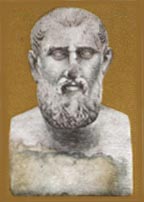| |
 Zeno, of Kitium in Cyprus, the founder of the Stoic school of
philosophy, was one of the greatest men that Cyprus ever produced. Zeno, of Kitium in Cyprus, the founder of the Stoic school of
philosophy, was one of the greatest men that Cyprus ever produced.The influence of his teaching spread through the Hellenistic world
and reached its height in Rome, where for two centuries it was the creed of many
distinguished Romans, including the great emperor Marcus Aurelius.
Zeno, the son of a Phoenician merchant of
Kitium, was born
about 336 B.C., at the time when Cyprus was a part of Alexander's empire. During his voyages in the Levant, he came across the writings of Plato, which led him to study
philosophy. He went to Athens and there studied in the Cynic, Epicurean, and Platonic
schools. Platonic school with its lofty idealism, was too far removed from the thought of
the average man of that age. The Epicureans, in their search for peace of mind and their
disregard for science, did not appeal to Zeno. In the Cynic school he found the practical
spirit which he divined to be the great need of that stirring, troublous age.
From being a learner, Zeno grew to be a teacher and, in
the Stoa, or painted corridor, in the market place of Athens, from which his school
derives its name, he taught a new philosophy suited to the individual needs of all classes
of men in a practical age. Stoic philosophy was frankly materialistic, but the whole of
the material universe was, according to Zeno, permeated and actuated by divine reason.
Man, being also actuated by the same force, could appreciate the laws of the universe of
which he forms a part, and should live in accordance with those laws. From this sprang a
view of man's social relations far in advance of the preceding schools of thought.
Zeno saw man as a rational being, subordinating his own
ends to the needs of the society of rational beings to which he belongs, in obedience to
the divine law of the universe. Those who own this universal law are the
citizens of one
state, the city of Zeus. In this city, all is ordered by reason, and the members exist for
the sake of one another. There is an intimate sympathy between all such wise and virtuous
citizens, which makes them friends even if personally unacquainted, and leads them to
contribute to one another's good. Their intercourse finds expression in justice and
friendship in private and public life.
In his "Republic", Zeno anticipated a state in
which all differences of nationality would be merged in the common brotherhood of man.
This cosmopolitan citizenship remained a distinctive Stoic dogma, and had a powerful
influence on the minds of men, especially in the Roman empire. From the time of Zeno, there
is no further record of dissension between the cities of Cyprus. Zeno died in 246 B.C.
|